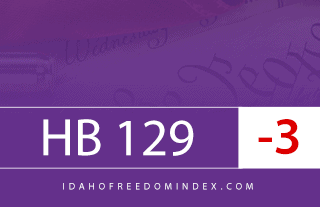


Bill description: This bill amends numerous aspects of the regulation process for dietitians in the Idaho Code.
Rating: -3
Analyst’s note: This Bill is a revised version of H0045 submitted earlier this legislative session. For this reason, much of the analysis remains the same as they were not affected by the revisions to the earlier text or by additional information provided thereupon.
Does it give government any new, additional, or expanded power to prohibit, restrict, or regulate activities in the free market? Conversely, does it eliminate or reduce government intervention in the market?
This bill would would add a list of what a dietician may or may not do to the new section of 54-3502A of the Idaho Code. This in addition to the scope of what a dietitian might already be allowed to do by their employer or the group under which they practice. Limiting the scope of what dieticians may do hinders the practice of their profession. (-1)
The bill does give the Board discretion to allow some individuals a biennial renewal of their licenses, although this is not guaranteed under the provisions. (+1)
Does it increase barriers to entry into the market? Examples include occupational licensure, the minimum wage, and restrictions on home businesses. Conversely, does it remove barriers to entry into the market?
This bill does make it harder for licensed dietitians moving to Idaho to get their licenses here. Under 54-3508, Idaho Code, individuals only have to be registered by the national commission and licensed by another state. The new addition will require individuals to document their never having been disciplined. Regardless of the resolution of a disciplinary action elsewhere, the bill precludes them from getting an Idaho license. The text, which says the applicant must “not have any disciplinary action, whether past, pending, public or confidential,” could provide grounds for an applicant to lose this ability for licensure by endorsement even for minor disciplines that are far from relevant. While this does not entirely preclude an applicant from obtaining a license, it would force them to submit a full application and go through the entire process that a first-time applicant might.(-1)
Does it directly or indirectly create or increase penalties for victimless crimes or non-restorative penalties for non- violent crimes? Conversely, does it eliminate or decrease penalties for victimless crimes or non-restorative penalties for non-violent crimes?
The bill includes a new provision that if an individual “Has been convicted of or pled guilty to driving under the influence of alcohol, drugs or other intoxicating substances, or has been convicted of or pled guilty to other drug or alcohol-related criminal charges,” the individual can be disciplined by the board (Page 9, Line 26). These offenses do not pertain to the individual's practice of dietetics. Punishment by the board is excessive and not relevant to the offenses and would simply be added on top of those imposed by the state. (-1)
This bill also adds a new section, 53-3510A, Idaho Code, which includes a slew of additional disciplinary procedures. Currently, the Board merely has the ability to restrict or revoke licenses. This new section would give the Board a greater variation in what discipline to apply to licensees so that they have more than just a one-size-fits-all approach for punishment. However, many of these sanctions are not reparative or restorative, only punitive in nature. One such example is a $1,000 fine for offenses. (-1)


